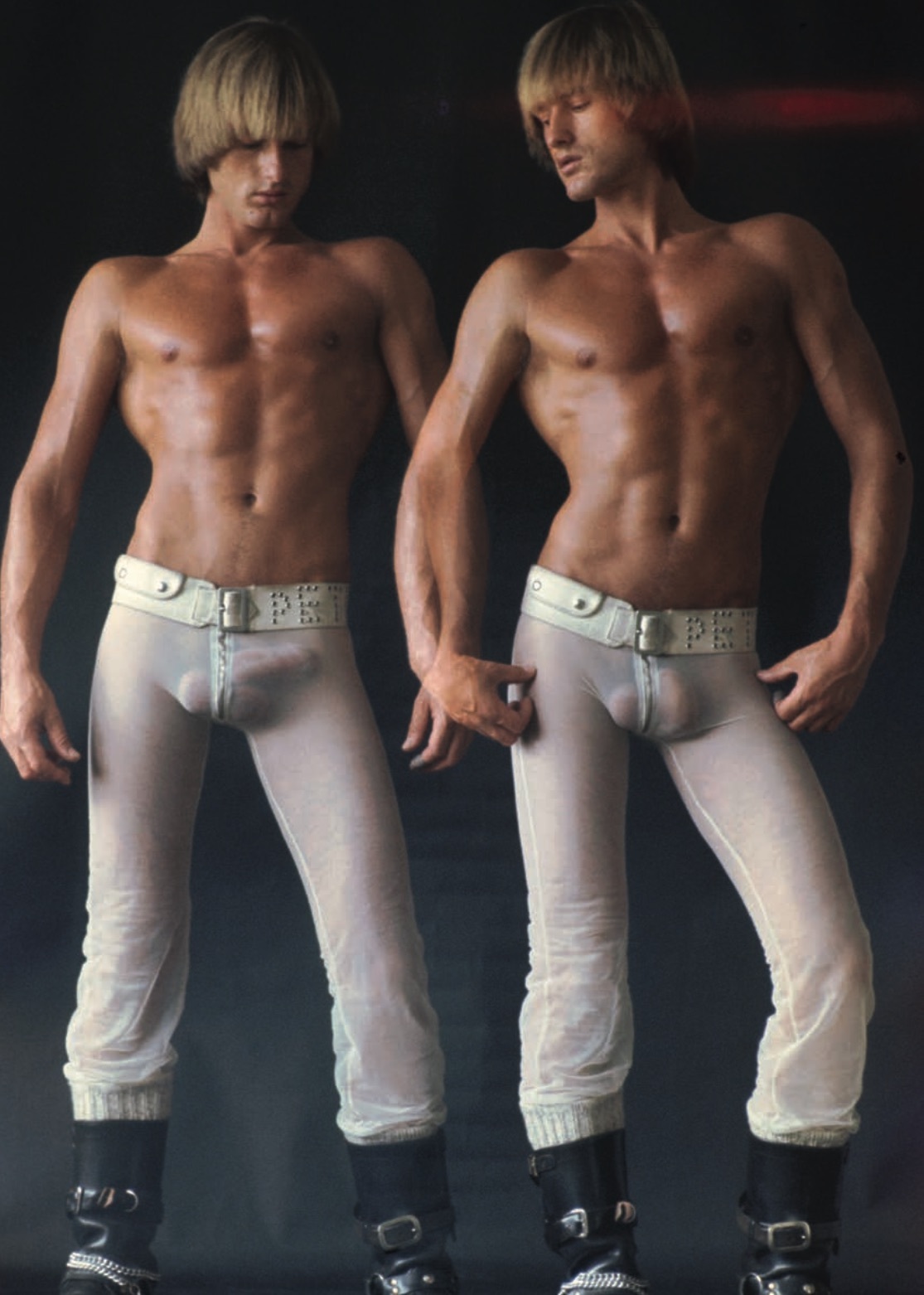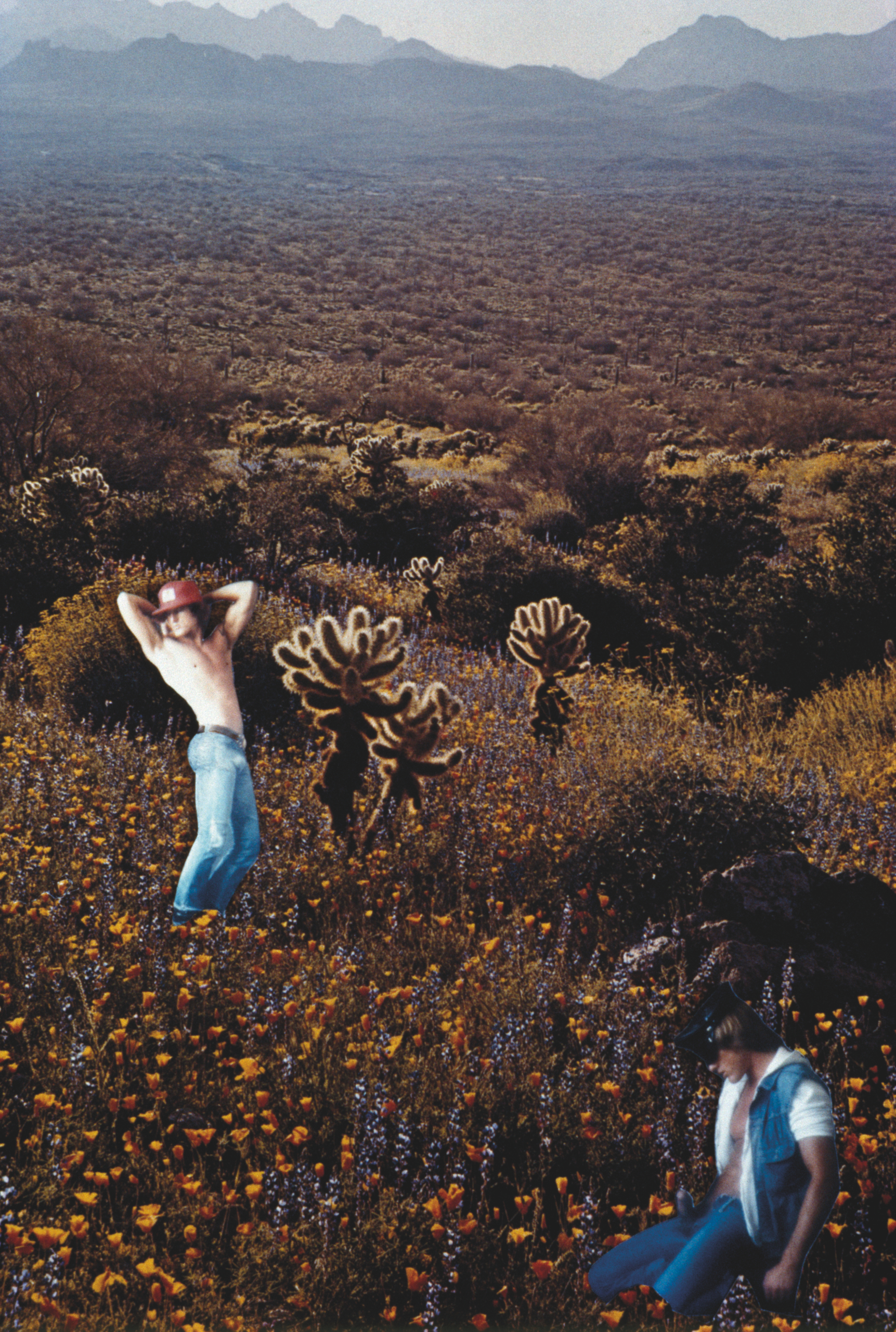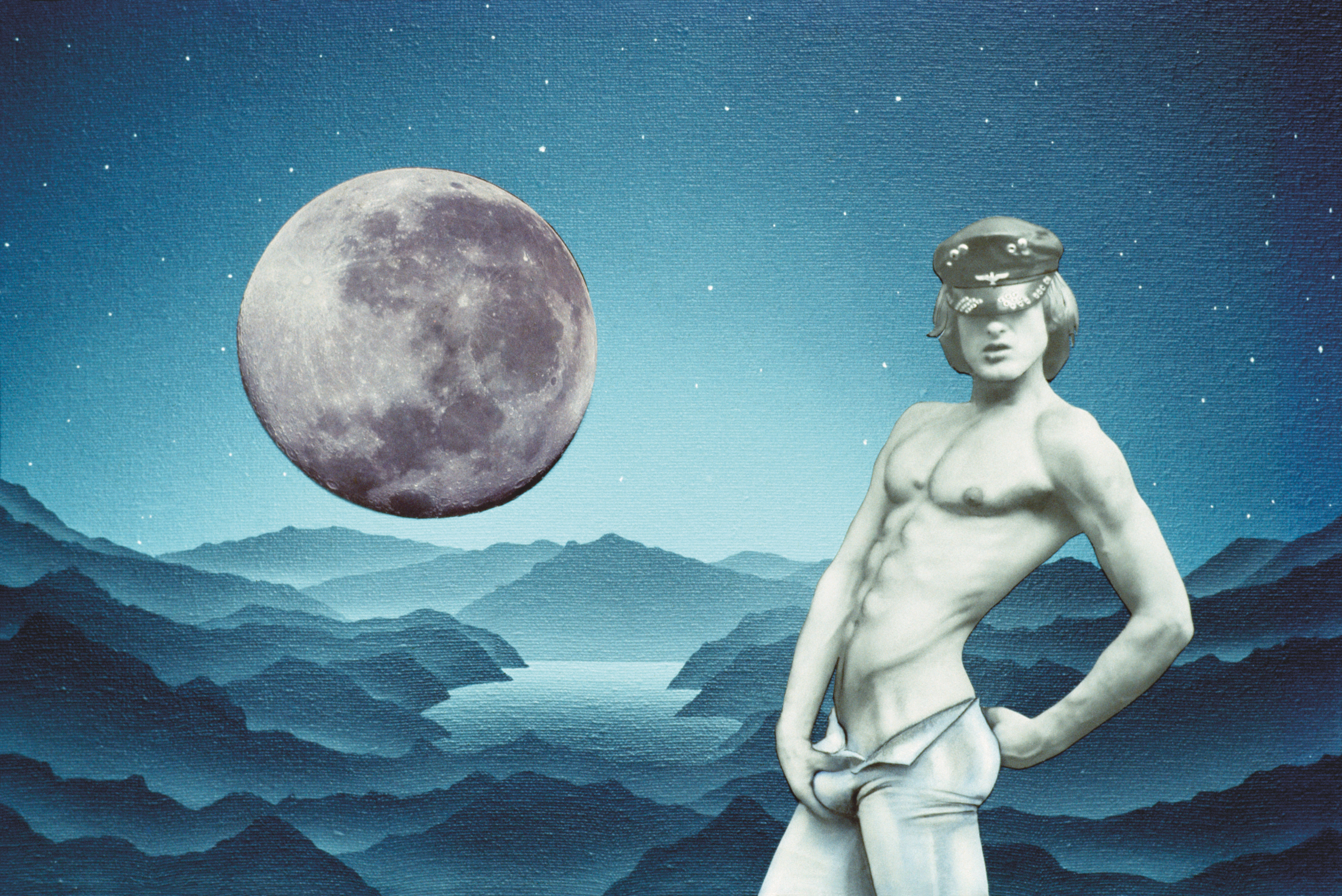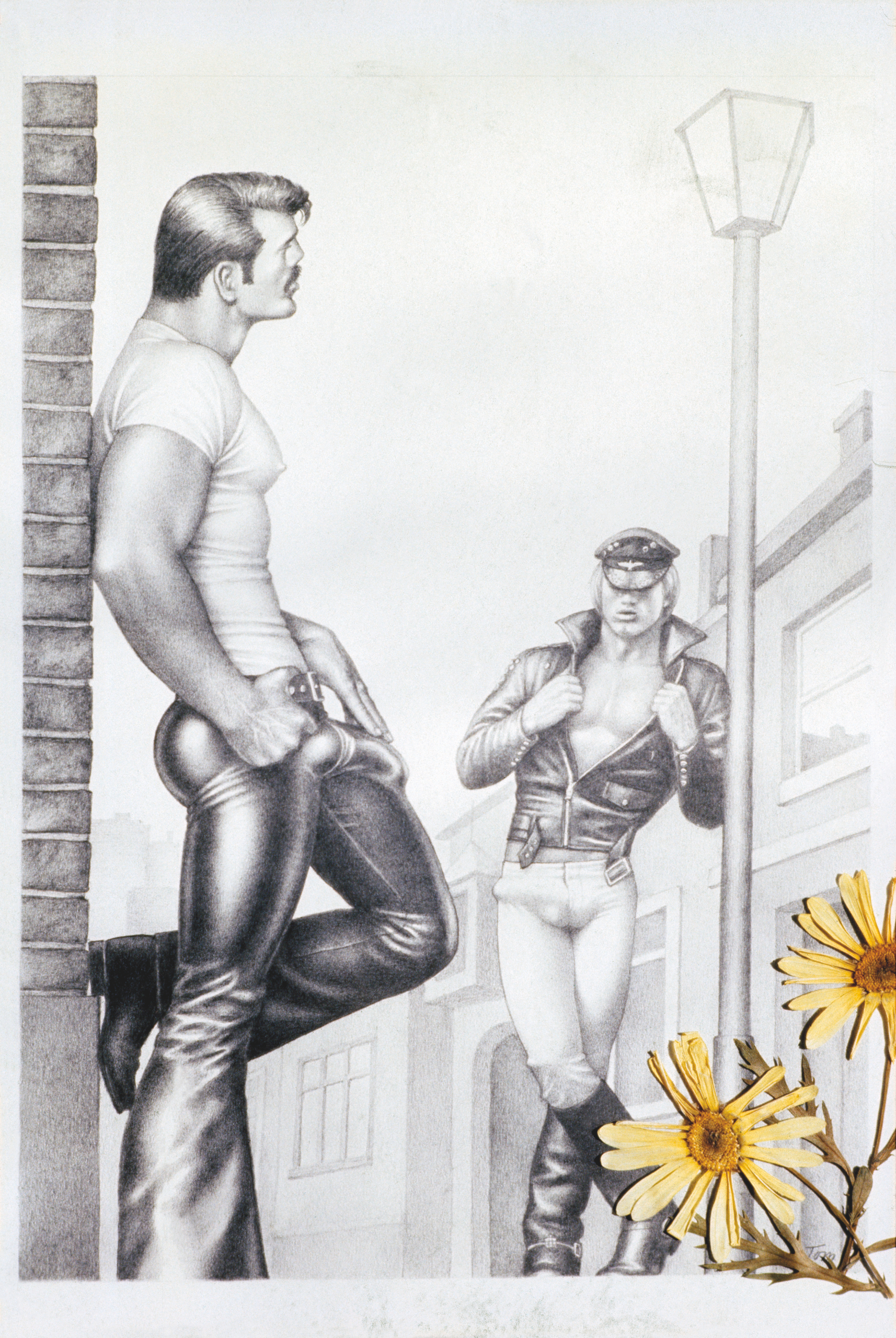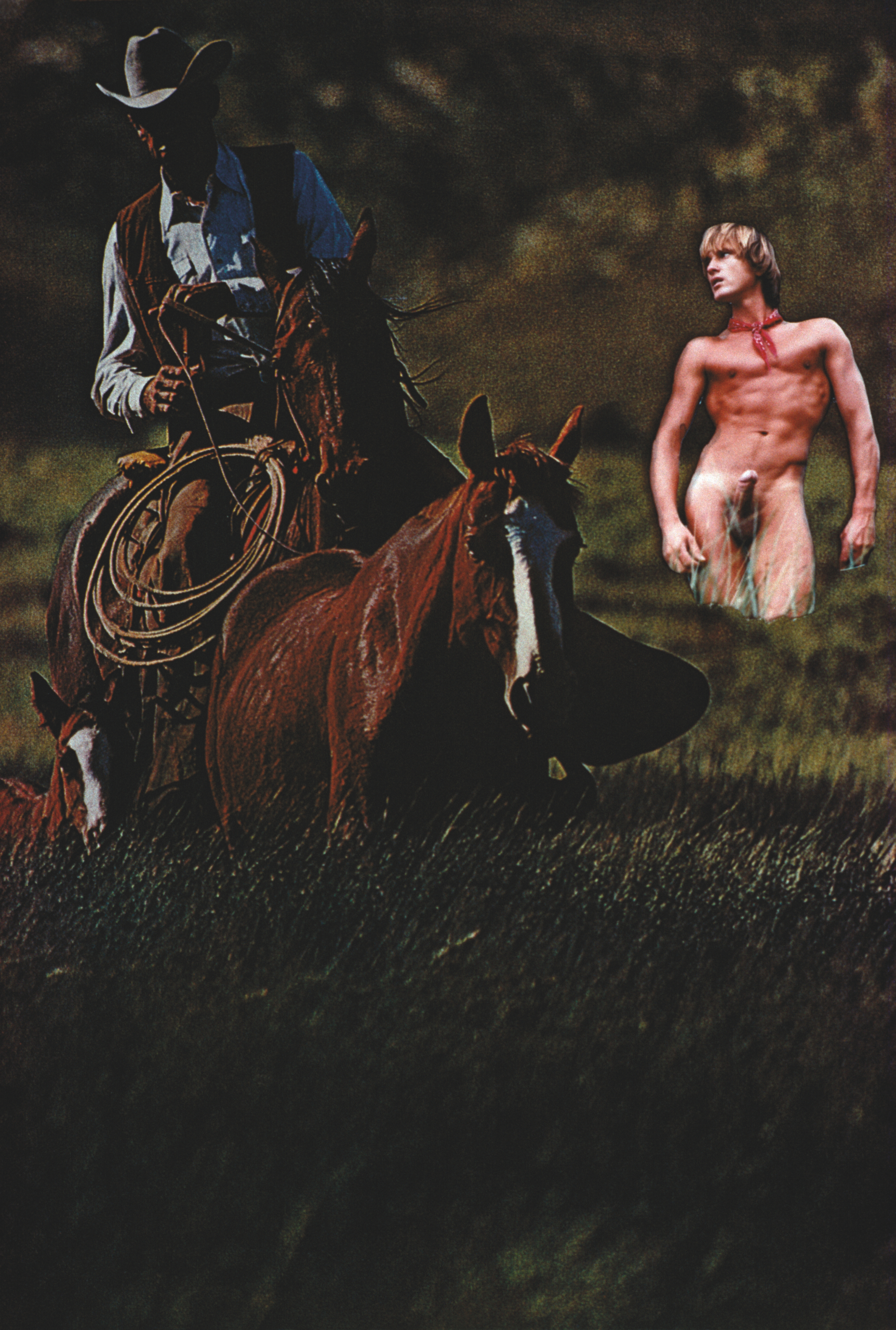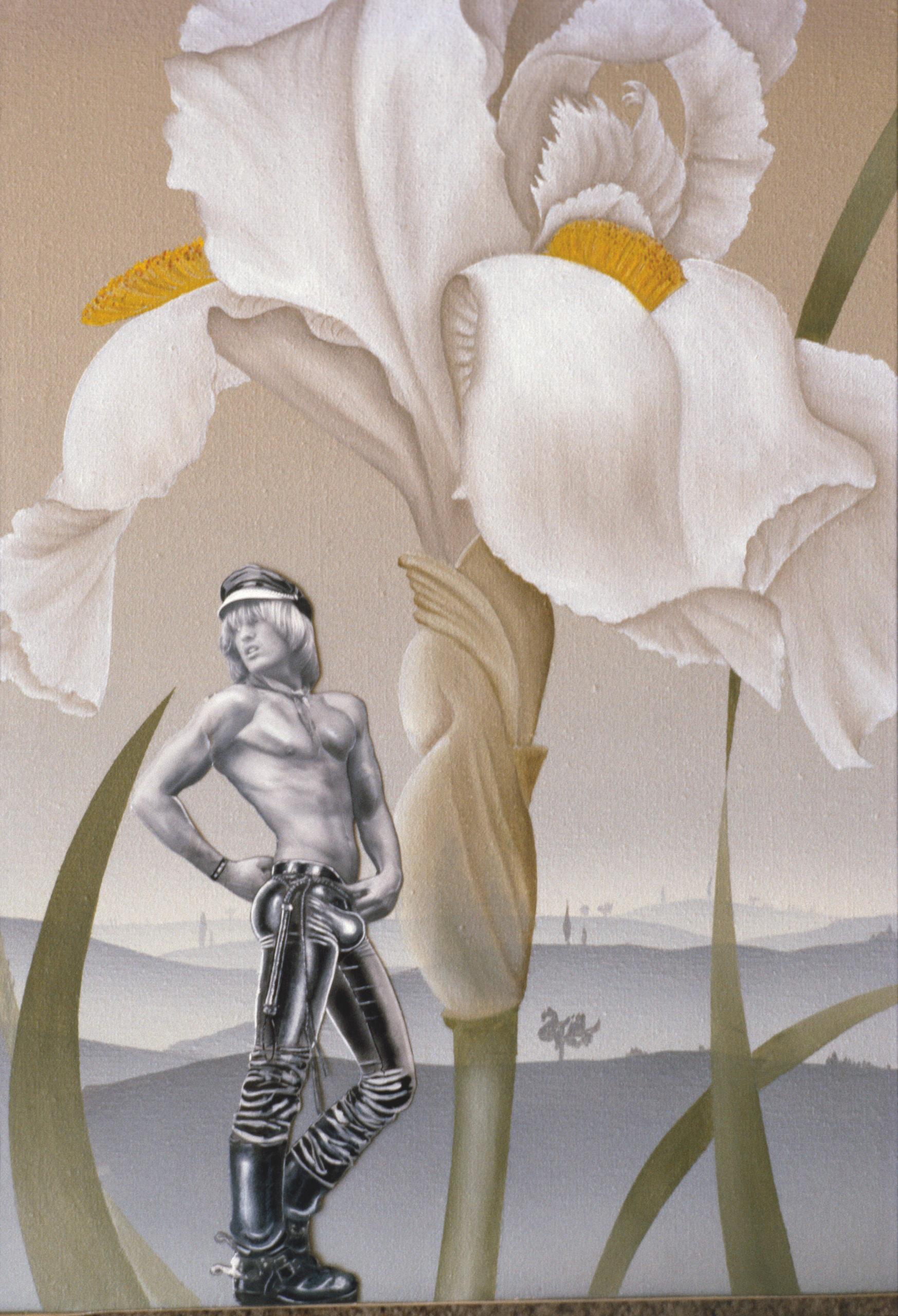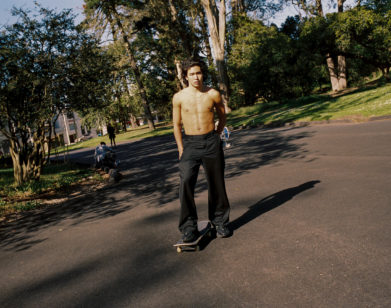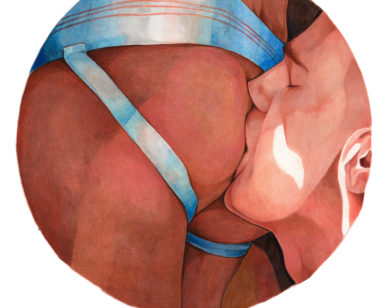Peter Berlin and Sean Ford Contemplate the Freedom and Performance of Gay Sex
The Dutch pageboy haircut. The skin-tight leather pants. That impossible-to-miss bulge. In the 1970s, Peter Berlin became an object of obsession as big—and as larger-than-life—as Marilyn Monroe or Mae West, making him arguably the first openly and overtly gay sex symbol of the modern age. Born Armin Hagen Freiherr von Hoyningen-Huene during the war in German-occupied Poland and raised in Berlin, the future Peter Berlin experimented with clothing, arousal, and exhibitionism from an early age. By the time he was in his late teens, he began cultivating a personality that would lead to his arrival in the street-cruising mecca of San Francisco in the early 1970s, and presto, a public persona like no other was born: Peter Berlin. This uninhibited, highly sexual, and unambiguously queer figure was the stuff of fantasy, a Tom of Finland drawing come to life, a porn film in the flesh, a lean, muscled, stylized European cosmopolitan dandy that seemed to emerge simultaneously from two very different petri dishes of decadence: the palace and the gutter. Armin didn’t become Peter Berlin—he inhabited him like a 24-hour, nonstop character performance, and the appreciation of the artistry was to perceive him, to lock eyes on his form with a mix of shock, scandal, and lust. The spectacle was almost exclusively visual (Berlin was and is not big into touching). He did, however, produce work that extended beyond his physical presence in real time: a wealth of photographs and self-portraits where Berlin poses in various states of dress and tumescence (sometimes multiplied in the same image, like twin brothers or erotic replicants) as well as two adult films (1973’s Nights in Black Leather and 1974’s That Boy).
The photography and film are vital and underappreciated works of art that bridge the division between the down-and-dirty verité style of Andy Warhol with the classical portraiture of Robert Mapplethorpe. The recent monograph Peter Berlin, edited by Michael Bullock and published by Damiani, has brought fresh interest and overdue attention to his artistic legacy. Had AIDS not so horrifically redefined the gay experience in the 1980s—both for gay men and in the way that the larger, heteronormative world acknowledged them—it’s entirely possible that Berlin’s influence might have sparked a revolution in male sexuality. Now, some 40 years later, with the persona long retired, a new generation seems to be picking up on the frank, liberating provocations of the queer icon. One such fan is the gay porn star Sean Ford, who called up the 77-year-old at his apartment in San Francisco to discuss sex, performance, and why monogamy is a waste of time.
———
PETER BERLIN: Sean, you are rather young, right?
SEAN FORD: Yes, I just turned 24.
BERLIN: And you’re in New York?
FORD: Yes, I’m in the East Village. How is San Francisco?
BERLIN: Every day I am aware that I’m so lucky to be stuck here because I talk to my mother almost every day—she lives in France—and the first thing she tells me is how bad the weather is. I say, mommy, “The weather here is beautiful.”
FORD: How has lockdown been for you?
BERLIN: Oh, I’ve locked myself down already for so long. I don’t go to restaurants, I don’t go to movies. So my life hasn’t changed at all. [Laughs.] I am quite lucky in that sense. But you are so young, so you want to go out and you want to mingle and connect. This is such a weird time. I think back to the 1960s, ’70s, and ’80s, I had such a great time. I would have hated to miss a moment of it. I feel sorry for you young people. But maybe I can cheer you up and give you some wisdom from an old person.
FORD: That would be appreciated. This is the first time I’ve interviewed someone, and when they approached me about talking to you, I couldn’t say yes fast enough.
BERLIN: So you have an idea who I am?
FORD: Yes, I definitely do. Even before I got into porn, I was very inspired by your work.
BERLIN: I see. If you had met me when you started in porn, I would have told you to get it over with and get out very quick. I was never part of a company for instance, working for others. But it seems you’ve enjoyed yourself?
FORD: Well, I definitely didn’t get out of it quick. I’m still here four years later.
BERLIN: May I ask, do you make a living with it?
FORD: Yeah, I make enough of a living now. It’s an industry that has evolved a lot, especially with the internet, so there isn’t as much money in it as there used to be, but there’s still enough for people to get by.
BERLIN: So I can call you if I need you to lend me some money?
FORD: I don’t think I could say no to Peter Berlin. You said you never really worked for a company. Still, I think a lot of modern gay porn performers can trace their professional lineage back to the Peter Berlin persona and the films you did. I don’t think I’m the exception. I think consciously or subconsciously for porn performers to have a persona and a stage name unlocks something inside of us. For you, for example, self-portraiture and cruising were very real parts of your life, weren’t they?
BERLIN: That was the only thing I was doing—looking for sex. But my way of sex was a little bit different than the way people usually enjoy themselves. The idea of touching and being involved very closely with a person was never my cup of tea. That’s why I only made two films. I produced those in a sense just to get it over with. So my films really didn’t have anything to do with an industry. I wouldn’t be able to perform on cue.
FORD: But do you think inhabiting the persona or character of Peter Berlin—especially as a self-described shy person, which I can relate to—gave you a greater sense of freedom to explore your interests?
BERLIN: It was a persona I inhabited. And when I was in that zone of being Peter, which was every time I left my house in the 1970s here in America, I was that character. Now, being that obvious and flashy and provocative created all kinds of problems. The people who liked that character, thought, “Oh my god, I want to get to him” and when I said, “Wait a minute, what about me? Do I want you?” that created a lot of negative feelings and negative situations where I immediately was seen as that arrogant idiot who thinks he’s great and had to reject a lot of people. And being rejected is terrible. I was very shy, and I’m still shy. I avoid people. But at that time, I was running around as that character and as good as I felt I also felt bad, being nice to one person and rejecting a thousand others. That’s exactly what I lived through. But it was interesting to see how people reacted when I exposed myself the way I did. They felt they had the right to grab me. And even when people would ask me what I wanted, I couldn’t answer because my way was always so different. It’s like, Sean, if I asked you, “Are you a bottom? Are you a top?” These are all labels and I never had an answer.
FORD: I struggle with the same thing. And no answer you give will satisfy them anyway.
BERLIN: I just lived that character. And I learned a lot about other people while doing it. I have a very good sense of who I am and what I want. If you want to have a good life, just look inside yourself and find your own answer, the true answer of what you really want. Because nobody out there will ever see who you really are if you don’t know yourself. You said you also struggle with being shy and meeting people. Do you have a partner?
FORD: Yes, I do, I have a boyfriend. We’ve been together about a year and a half now.
BERLIN: Is it nice? Of course you will have to say yes because we are in an interview. I always discourage people from having a boyfriend. I never gave that title of a boyfriend to any person in my life. I make friends, good friends, maybe starting with sex and then when that sex is sort of not so important… well, I only hope that you have a very open relationship.
FORD: Yes, honestly, I couldn’t have it any other way, I don’t think.
BERLIN: Nobody can. Maybe three couples on this planet can really have it all. But I tell you, whatever I have seen when I’ve observed other couples—and I have been observing them for 60 years—I think, “My god, what a tragedy it is when people fall in love.” I don’t even know what that means because I never fell in love. I was in lust with people and then maybe when it really was great, I had a repeat, but I never wanted to say, “Now I want to have you for the rest of my life, you are my boyfriend.” Are you married?
FORD: No, I’m not married. I don’t know if I believe really in the concept of marriage.
BERLIN: You see, Sean, I tell you, you only marry for money, for a Green Card, or for taxes and the IRS. Please don’t marry for what they call love. I thought a lot about that word “love” because it’s used everywhere. People love each other and yet, I don’t see much love on this planet anymore. I see people in pain, people in agony, people frustrated. It’s a different world now than when I was young. Twenty years ago, when I had a good time with a guy, I never talked before sex because that destroys a lot. But afterwards, I talked to people. They were usually younger than me—I don’t like old people too much, I like people your age. I would tell these people, “I’m ashamed to be of the generation to give you this world,” because I think it is unbelievable what humans did to this planet and to themselves and to everything. It is such a tragedy, Sean. Unfortunately, the future doesn’t look too bright. So just try to have a sense of yourself, just try to make it not more difficult. Rather than having a boyfriend, have a lot of good friends.
FORD: I agree that exclusivity is boring and harmful. Openness, honesty, and communication are, for me, the only important things in a relationship. As for falling in love, even with a “boyfriend,” I fall in love with everything and everyone.
BERLIN: Yes, that it seems you will have a good time. Just be honest, always to yourself and to your partner. Never fear about cheating. I never had an ounce of jealousy in my life. I don’t know what jealousy is. But I have seen what it does to people.
FORD: I don’t know that I believe in jealousy either.
BERLIN: Good for you. And maybe this sex business you are in is a good thing where you can say, “Sex is good,” and get paid for it without prosecution. I don’t know if you saw the mugshot they took of me in 1972 in San Francisco. I had three charges against me, including the charge of prostitution. I said, “Okay, am I a prostitute? Shouldn’t we all be prosecuted then?” Whatever we do that someone pays us for is prostitution, right? But only when it comes to sex does it have a whole different connotation.
FORD: I agree. In a capitalist economy, any job is sort of prostitution.
BERLIN: When you see these beautiful, young women with Gucci bags and Dior clothes coming out of Neiman Marcus, and then they are married to a short, fat, nice man, I say, “Okay. It’s the same thing, the only difference being you are married.” We are all prostitutes, right? I have very few good feelings about my fellow man. That’s why I basically live by myself and don’t mingle with people. But that’s also a luxury. Most people have to mingle, have to go to work and interact and have other people in their lives. I’m so glad. Sean, I’m very poor. So again, when you make a lot of money, I can give you my bank account and you can send me checks.
FORD: I’ll let you know when I start making a lot of money.
BERLIN: You see, the problem was that money was never interesting to me. The people with money would always invite you to see their big houses and I said, “Why do they show me their house? Maybe he wants to give me the house as a present?” Otherwise, I never cared for that. I was going out and having a good time with people either my age or younger. I never looked for my father. I wish I had looked for my father because I would have then chosen a rich father.
FORD: I share that sentiment. Money or even fame isn’t really appealing to me. I take much more value in having good friends and having a good time.
BERLIN: I’m sort of famous, at least in the gay world. Most straight people have no idea who I am. But I am so surprised that as an old man, people know Peter Berlin. But you’re not talking to Peter Berlin now, you’re talking to the person who played him very well. I miss Peter. I miss him very much.
FORD: As a gay man in the mid-20th century, and to this day, there was a lot of fixation on celebrity. Many queer men projected what they wanted to be onto the female stars of Hollywood like Marilyn Monroe and Judy Garland, and they projected their desire for male intimacy onto the male stars like James Dean and Marlon Brando, none of whom were ostensibly, or at least openly, queer by today’s standards. You sort of represented a fusion of these things. You were someone who gay men both desired and desired to be precisely because of your sexual image. At the same time, you maintained a mysterious allure that has kept gay men fascinated up to the present.
BERLIN: I can understand why that image has survived. On the other hand, when I was Peter Berlin, as you say, there were a lot of other guys doing what I was doing, having their leather or their tight pants and this and that. I guess I’m one of the very few who are still in the discussion. I know there are still great admirers, just as I know I am not some people’s cup of tea.
FORD: Everyone has their preferences.
BERLIN: What is your preference? Your boyfriend, is he similar to you?
FORD: He’s French and he’s about a year older.
BERLIN: I lived in Paris for a while. I had my share of French people. I don’t think in terms of French or German or American. I don’t think about Black and white. In the end, it isn’t so much about where you come from but what you’re doing in the moment. Do you speak French?
FORD: My boyfriend constantly tells me I should learn French.
BERLIN: Hear, hear, Sean. Learn languages. Pack your bags and go live in Paris for a while. If I had my say, I would send all the American students to live for one year in Europe. I tell you, you can’t underestimate what it does, because then you really see we all the same and I think we wouldn’t have this animosity.
FORD: I think there’s a different way of living in Europe that would be valuable for Americans to get a glimpse of. We are so insular here. You arrived in America in the early ’70s, which was a time of radical change here. The country had watched war and a counterculture unfold, assassinations, and a movement for Black civil rights. The current times in which we live mirror those times in some ways, and now we have sort of a second-wave civil rights movement that is not only anti-police and anti-white-supremacy, but also anti-capitalism.
BERLIN: I came to this country as a German. And we Germans are known to have built some good cars, right? But there was also animosity toward us because we did awful, awful things. But then I realized, “My god, every nation can do and has done awful, awful things.” I knew from very early on how hard Black people have it to live in America. I remember some Black GIs in Germany because there were many U.S. stations in Berlin because of the war. The Black GIs loved Berlin, because we didn’t look at them like they were something bad. A lot of Black GIs stayed and married German girls. When I came to America and saw how the country treated Black people…. There was a time when I met Robert Mapplethorpe in the ’70s. He told me that he only had sex with Black people. And I told him, “Robert, there are some nice white blond guys, too.” He said, “No, no, I just have sex with Black people.” I couldn’t understand it. Then over the years, I realized that more and more people I hooked up with were Black. I tell you their beauty is unmatched.
FORD: I think in the Western world we are conditioned not to view Black people through a sexual lens, or if we do, it’s fetishizing. But more and more people are learning to unlearn that conditioning and learning to see beauty everywhere.
BERLIN: Yes. We are sort of brainwashed at a young age and we believe everything the adults are telling us, especially when it comes to religion. I’m so glad I was born into a liberal situation. And thank god I was not Catholic because what the Catholic Church is doing on the minds of young people is, in my view, criminal.
FORD: You’ve said that you feel you failed in your quest to change the way men understand sexuality. Why do you think you’ve failed? Speaking for myself, the example of sexual freedom you set is central to my life, and that extends beyond porn and into fashion, photography, and elsewhere. I think it applies especially to the younger Generation Z, who have fewer hang-ups about sexuality and identity. I really think they’re starting to shed the baggage of repressing themselves, and you kicked that off.
BERLIN: When I created my self-portraits, I did them just for my own enjoyment. I said, “When I look in the mirror, it looks good, so take a photograph.” In other words, I look at myself as a sort of journalist. They were not staged, they were actually just me. It is very different than, say, a photographer coming over and taking your picture. I encourage people to take selfies, take selfies, take selfies, because one day in 50 years you’ll look at yourself and say, “What happened to me?” But I’m such a visual person. People put so many labels on me. Peter Berlin, he’s an exhibitionist, he’s a pornographer, he’s a photographer, he’s a designer. I’m all kinds of things. When it is looked at as something positive, then I am an exhibitionist. But it’s usually looked at as a negative. We are all exhibitionists! We are all trying to look nice, especially the women—they are much better than the men because they put on lipstick and a tight dress and they show the tits. Men are such idiots. Do you ever see people like Peter Berlin running around in New York?
FORD: I certainly wish I did. Is that why you think you failed?
BERLIN: I did say that I look at myself as a failure because I would love to have had imitators, men who say, “If Peter Berlin can run around like that, I can do it, too!” But there is nobody doing it, nobody. Men are so shy. Maybe they’ll open their shirt and show their six-packs, but you don’t see any dick. I’m not so focused on the dick, but it is part of a man’s body. What people do is they hide it. But Peter Berlin was not hiding it and saying, “Here, look at me, head to toe. There’s a dick and there’s an ass.” I’ve thought about this, and I realize when a man is hiding his beauty, his sexuality, then he will get frustrated and he will take it out on someone else and kill. And that’s how I see the state of the world. When you think about what you now see every day in the papers. When the police are running the streets and beating up the protesters, these are not gay people. These are straight, frustrated people who are saying, “Now I can have a go with my frustration so I can be a man.” That is basically that facet of my thinking. If a man will not learn to be like Peter Berlin, then he will do that which you see—all this brutality. If the police would only be filled with gay people, they would do a good job, right? They are the ones you would want to be confronted with when there is a problem. Not white straight people. As Peter Berlin, when I was running around on the street, I was not afraid of muggers, I was running away from the police.
FORD: Just as your character Helmut [in That Boy] was able to be the blind boy’s eyes, you’ve been able to open our eyes to the celebration of sexual freedom and let us into a time and place that will never exist in quite the same way. I am grateful for that. Thank you, Peter. It’s been a pleasure.
BERLIN: But Sean, it was a pleasure to talk to you.

